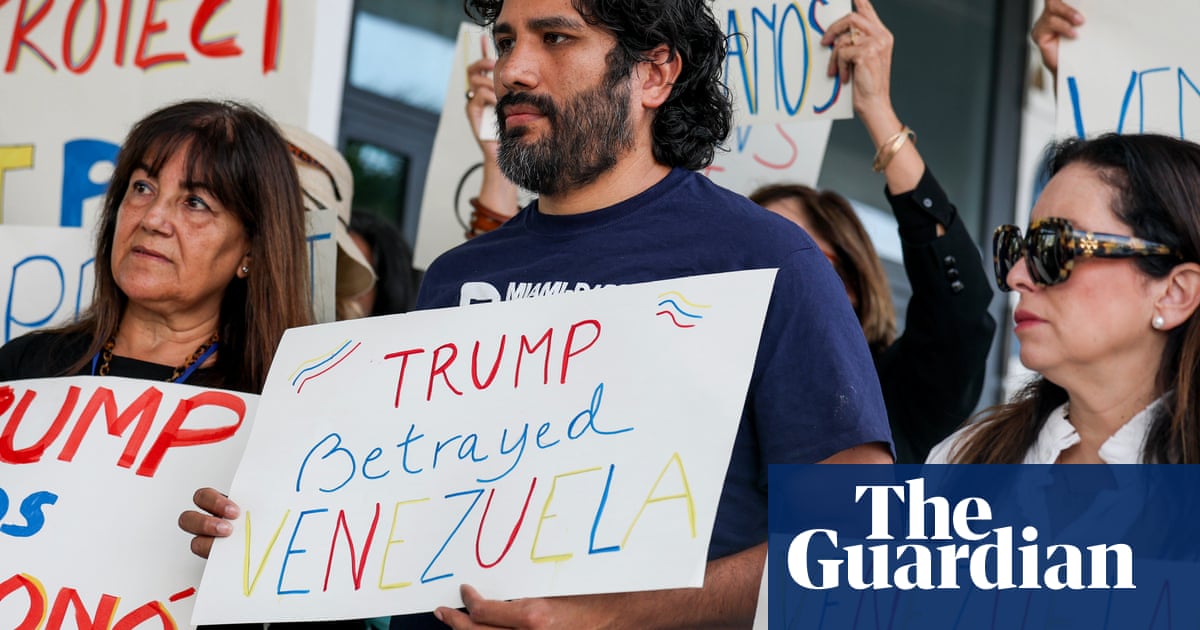Donald Trump’s administration can end legal protections that have shielded about 350,000 Venezuelans from potential deportation, the supreme court ruled on Monday.
America’s highest court granted a request byKristi Noem, the homeland security secretary, to revoke temporary protected status (TPS) for the Venezuelans while an appeal proceeds in a lower court.
The government grants TPS to foreign citizens who cannot safely return home because of war, natural disasters or other “extraordinary” conditions, giving them deportation protection and access to work permits.
Trump’s predecessor, Joe Biden, hadgrantedthe status to Venezuelans due to political and economic strife in their home country. Venezuela’s president, Nicolás Maduro, haspersecutedlawyers and journalists while millions of citizens suffering hardship have sought refuge elsewhere.
Biden extended TPS for another 18 months just days before Trump, who pledged to deport record numbers of undocumented immigrants, returned to the White House in January.
In March a federal judge in California put a temporary stay onTrump administrationplans to end TPS for the Venezuelan nationals. The San Francisco-based district judge Edward Chen said the plan to end TPS “smacks of racism” and mischaracterises Venezuelans as criminals.
“Acting on the basis of a negative group stereotype and generalizing such stereotype to the entire group is the classic example of racism,” Chen wrote, adding that Venezuelan TPS holders were more likely to hold bachelor’s degrees than US citizens and less likely to commit crimes than the general US population.
The San Francisco-based ninth US circuit court of appeals on 18 April declined the administration’s request to pause the judge’s order.
The Trump administration thenasked the supreme court to intervene. Justice department lawyers said in their filing that Chen had “wrested control of the nation’s immigration policy” away from the government’s executive branch, headed by Trump.
“The court’s order contravenes fundamental executive branch prerogatives and indefinitely delays sensitive policy decisions in an area of immigration policy that Congress recognized must be flexible, fast-paced, and discretionary,” they wrote.
The plaintiffs, including some of the TPS recipients and theNational TPS Allianceadvocacy group, said Venezuela remains an unsafe country.
They told the supreme court that granting the administration’s request “would strip work authorization from nearly 350,000 people living in the US, expose them to deportation to an unsafe country and cost billions in economic losses nationwide”.
But the supreme court granted the justice department’s request. Its brief order was unsigned, as is typical when the justices act on an emergency application. The liberal justiceKetanji Brown Jacksonwas the sole member of the court to publicly dissent.
Democrats in the House of Representatives condemned the decision.
Pramila Jayapal, ranking member of the immigration integrity, security and enforcement subcommittee, said in a statement: “It is shameful that the Trump administration would pull the rug out from so many Venezuelans who came into the country lawfully, fleeing untold violence and devastation in their home country.”
Congresswoman Debbie Wasserman Schultzposted on social media: “Venezuelan TPS holders fled the Maduro regime and built lives in America. This atrocious decision allows Trump to deport non-criminals back to a murderous dictator. This fight is NOT over. We must pass my Venezuela TPS Act to keep our community safe.”
The state department currentlywarns against travelto Venezuela “due to the high risk of wrongful detentions, terrorism, kidnapping, the arbitrary enforcement of local laws, crime, civil unrest, poor health infrastructure”. The department withdrew all diplomatic personnel in 2019.
Trump campaigned for president promising to deport millions of undocumented migrants and a number of his executive orders around immigration have encountered pushback from judges across the country – including the supreme court.
Trump lashed out at the court last week after itblocked his effortto resume deportations of alleged members of the Venezuelan gang Tren de Aragua using an obscure wartime law, the 1798 Alien Enemies Act.
In a 7-2 decision the court, which includes three justices nominated by Trump, said the alleged Tren de Aragua members were not being given enough time to legally contest their removal.
Trump responded: “The Supreme Court of the United States is not allowing me to do what I was elected to do. This is a bad and dangerous day for America!”
The Trump administration in April also terminated TPS for thousands of Afghans and Cameroonians in the US. Those actions are not part of the current case. Pre-emptive arrests of many people still under the shelter of TPS have been carried out despite the lawsayingsuch people “shall not be detained” based on their immigration status.
